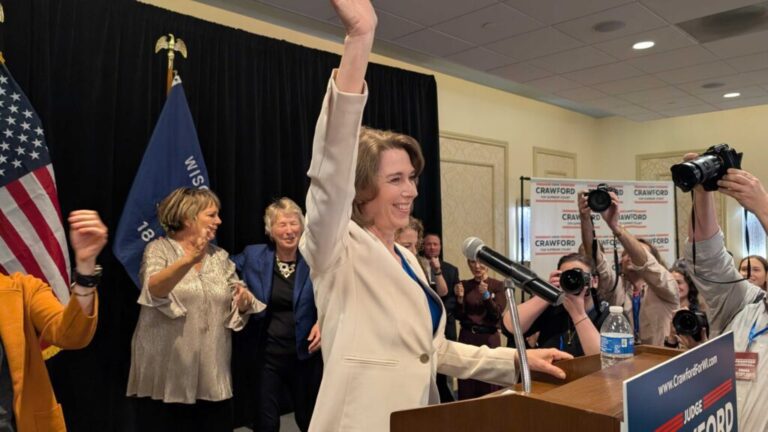Susan Crawford Elected to Wisconsin Supreme Court, Shaping Future of State Judiciary
In a significant shift for Wisconsin’s judicial landscape, Dane County Judge Susan Crawford has been elected to the Wisconsin Supreme Court, securing a firm foothold for liberal values until 2028. This election not only highlights voter sentiment against former President Donald Trump’s policies but also demonstrates the substantial financial impact of influential figures like Elon Musk.
Election Overview
Crawford’s victory was marked by a remarkable voter turnout in key areas including Dane and Milwaukee counties, where she outperformed Vice President Kamala Harris’ previous campaign metrics. Defeating her opponent, Brad Schimel, by approximately 11 points, she aims to advocate for the rights of all Wisconsinites from her new position on the bench.
Key Issues and Campaign Dynamics
Throughout her campaign, Crawford emphasized her commitment to civil liberties, criticizing Schimel’s alignment with Trump and the financial support he received from Musk. This campaign is particularly pivotal, as it maintains the liberal majority in the Wisconsin Supreme Court, which has held since the election of Justice Janet Protasiewicz in 2023.
Major Takeaways from the Election
- The election marks a third consecutive win for liberal candidates in Wisconsin’s Supreme Court elections.
- Crawford’s campaign focused on protecting fundamental rights, in contrast to Schimel’s perceived partisanship.
- The outcome signals a potential shift in addressing contentious state policies, including gerrymandering and abortion rights.
Financial Backing and Influence
This election also set a record for the most expensive judicial campaign in U.S. history, surpassing $100 million in expenditures. Despite significant contributions from liberal donors like George Soros and J.B. Pritzker, Musk’s investment outshone all others, contributing over $20 million, primarily via attack ads aimed at Crawford’s record.
Implications of the Win
Crawford’s victory is expected to influence upcoming rulings on crucial issues, including abortion rights, union rights for public employees, and the legality of Wisconsin’s congressional maps, which have favored Republican control. This judicial direction will critically shape the conversations around these pivotal topics in the state.
Community Response and Future Prospects
In her celebratory remarks, Crawford expressed gratitude for the support she received and her mission to uphold justice for all Wisconsinites. She stated, “I never could have imagined that I’d be taking on the richest man in the world for justice in Wisconsin. And we won.”
Governor Tony Evers commented on the election outcome, emphasizing that voters demonstrated their unwillingness to be swayed by financial power, and reaffirmed their commitment to core American values such as justice and equality. Evers stated, “This election was about doing what’s best for our kids and defending against attacks on basic rights.”
Concession Speech and Aftermath
In his concession speech, Schimel acknowledged the defeat, encouraging his supporters to hold steadfast for future endeavors despite the loss. He stated, “…the numbers aren’t going to turn around. Too bad. We’re not going to pull this off.”
Conclusion
Crawford’s election solidifies a significant moment in Wisconsin’s political landscape, with implications that reach beyond the courtroom. As the liberal majority prepares to address fundamental legal questions, this election reinforces the influence of grassroots movements against the backdrop of formidable financial interests.
This story was originally published by the Wisconsin Examiner.


